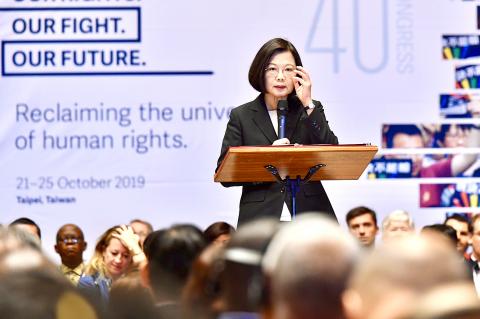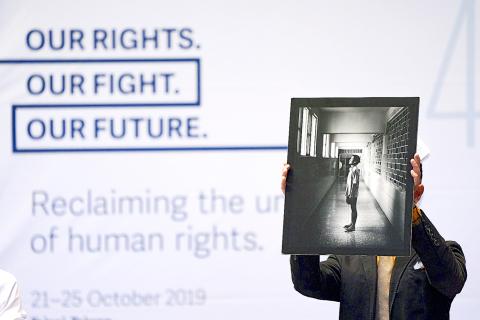The International Federation for Human Rights (FIDH) yesterday opened its 40th congress in Taipei, the first time the event has been held in Asia.
More than 400 rights advocates, government officials and experts from 184 non-governmental organizations (NGOs) in 112 countries are attending the five-day congress, said the Taiwan Association for Human Rights, which is cohosting the event.
Taiwan was chosen to host this year’s congress, which is held every three years, because it is a vibrant democracy, which “stands in stark counterpoint to many of its regional neighbors,” the federation said.

Photo: Tu Chien-jung, Taipei Times
In a speech at the opening ceremony, President Tsai Ing-wen (蔡英文) said the government is committed to improving human rights protection in a wide range of areas.
Her administration has introduced measures to eliminate workplace discrimination against women, promoted judicial reforms and pushed legislation to make Taiwan the first Asian nation to legalize same-sex marriage, she said.
“I have to tell you it was not an easy process to go through, but we finally made it,” she said.

Photo: CNA
The road to human rights is a long one, but together with NGOs, the government would continue to work toward building “a fairer and more just” Taiwan, she said.
The congress will hopefully provide an opportunity for Taiwan to learn from other nations’ experiences and share its own, Tsai added.
Under this year’s theme of “Our Right, Our Fight, Our Future — Reclaiming the Universality of Human Rights,” congress delegates hope to explore questions such as how to ensure equal rights for minorities and in cross-border situations, association president Clarence Chou (周宇修) said.
The sharing of experience between advocates and experts from different parts of the world is essential in the fight to improve human rights, he said.
The ceremony also featured an open plea from former death row inmate Hsu Tzu-chiang (徐自強) for Chiou Ho-shun (邱和順), who remains on death row, and whom Hsu said was wrongfully convicted of murder as he had been.
Hsu, who was convicted of the 1995 kidnap and murder of businessman Huang Chun-shu (黃春樹), was imprisoned for 16 years, spending most of the time on death row, before he was released in 2012.
It took another four years to clear his name, as it was not until October 2016 that the Supreme Court ruled that he was not guilty, rejecting prosecutors’ appeals.
Hsu’s was one of the nation’s highest-profile human rights cases at the time.
Chiou was sentenced to death for the 1987 kidnap and slaying of nine-year-old Lu Cheng (陸正).
The Supreme Court in July 2011 reaffirmed his death sentence.
His case is controversial because of the lack of forensic evidence, and allegations that his confession was obtained under torture.
“I do not have big dreams. I only hope that there will not be another Hsu Tzu-chiang,” Hsu said, expressing the hope that the federation would help Chiou as it helped him.
The congress features a two-day forum, which began yesterday, followed by internal meetings on the organization’s governance and a board election, the federation said.
Additional reporting by staff writer

A Ministry of Foreign Affairs official yesterday said that a delegation that visited China for an APEC meeting did not receive any kind of treatment that downgraded Taiwan’s sovereignty. Department of International Organizations Director-General Jonathan Sun (孫儉元) said that he and a group of ministry officials visited Shenzhen, China, to attend the APEC Informal Senior Officials’ Meeting last month. The trip went “smoothly and safely” for all Taiwanese delegates, as the Chinese side arranged the trip in accordance with long-standing practices, Sun said at the ministry’s weekly briefing. The Taiwanese group did not encounter any political suppression, he said. Sun made the remarks when

The Taiwanese passport ranked 33rd in a global listing of passports by convenience this month, rising three places from last month’s ranking, but matching its position in January last year. The Henley Passport Index, an international ranking of passports by the number of designations its holder can travel to without a visa, showed that the Taiwan passport enables holders to travel to 139 countries and territories without a visa. Singapore’s passport was ranked the most powerful with visa-free access to 192 destinations out of 227, according to the index published on Tuesday by UK-based migration investment consultancy firm Henley and Partners. Japan’s and

BROAD AGREEMENT: The two are nearing a trade deal to reduce Taiwan’s tariff to 15% and a commitment for TSMC to build five more fabs, a ‘New York Times’ report said Taiwan and the US have reached a broad consensus on a trade deal, the Executive Yuan’s Office of Trade Negotiations said yesterday, after a report said that Washington is set to reduce Taiwan’s tariff rate to 15 percent. The New York Times on Monday reported that the two nations are nearing a trade deal to reduce Taiwan’s tariff rate to 15 percent and commit Taiwan Semiconductor Manufacturing Co (TSMC, 台積電) to building at least five more facilities in the US. “The agreement, which has been under negotiation for months, is being legally scrubbed and could be announced this month,” the paper said,

MIXED SOURCING: While Taiwan is expanding domestic production, it also sources munitions overseas, as some, like M855 rounds, are cheaper than locally made ones Taiwan and the US plan to jointly produce 155mm artillery shells, as the munition is in high demand due to the Ukraine-Russia war and should be useful in Taiwan’s self-defense, Armaments Bureau Director-General Lieutenant General Lin Wen-hsiang (林文祥) told lawmakers in Taipei yesterday. Lin was responding to questions about Taiwan’s partnership with allies in producing munitions at a meeting of the legislature’s Foreign Affairs and National Defense Committee. Given the intense demand for 155mm artillery shells in Ukraine’s defense against the Russian invasion, and in light of Taiwan’s own defensive needs, Taipei and Washington plan to jointly produce 155mm shells, said Lin,